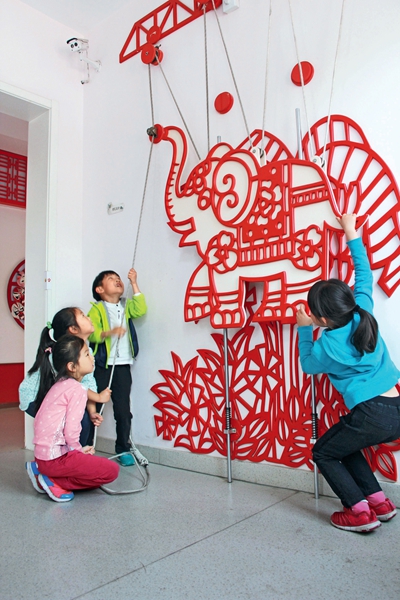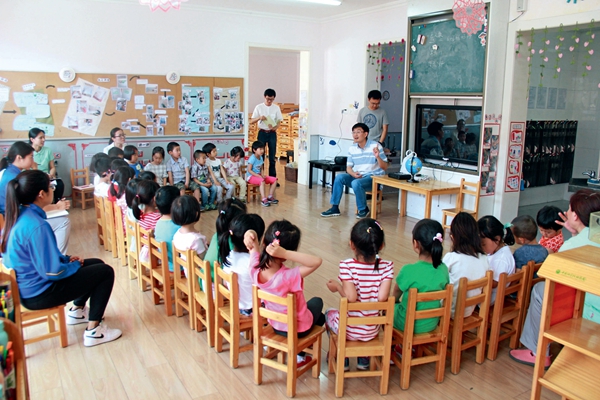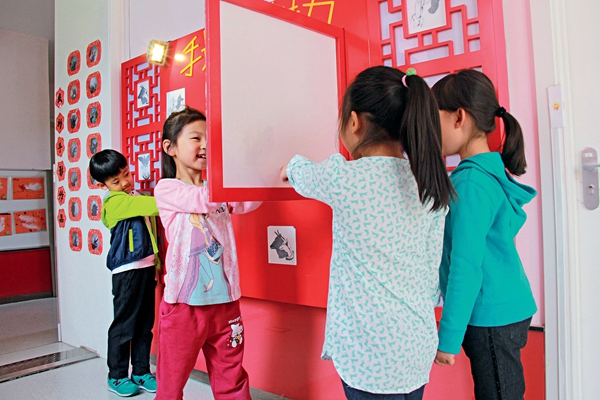By LIU SUFANG & staff reporter ZHOU LIN
By LIU SUFANG & staff reporter ZHOU LIN
A model car in a kindergarten in Beijing’s Haidian District clearly mystifies and fascinates a class of hawk-eyed children. The rays of sun set the car moving. Boys and girls alike jostle to take a good look at this solar-powered auto. Some lie on the ground and peer beneath it to check they aren’t being fooled. The class as a whole peppers the lecturer with questions. This is a science class at Middle Class 2 at the Chinese Academy of Sciences (CAS) No. 3 Kindergarten. The lecturer, Jin Kui, is director of the SC2 research division and doctoral supervisor of the National Laboratory for Superconductivity (NLSC) at the CAS Institute of Physics. Jin Kui was selected by China’s “Recruitment Program of Global Doctors” and the institute’s “One Hundred Talent Program” and is a CAS No.3 kindergarten parent advisor. His son Jin Chuzi attends this kindergarten.
Science Education Made Fun
“Children are insatiably curious, because it’s by asking questions that they learn. That’s why it’s so important to direct their attention to multiple aspects of their immediate environment and show how they relate to fundamental principles of physics,” Jin Kui said.

School children operate an elephant puppet and get it to move its trunk by pulling strings that activate block and tackle pulleys.
Bearing in mind the way children’s minds work and how best to capture their interest, Jin wrote a fairytale with a scientific edge. He also devised games to teach children about renewable energy sources like solar and wind power.
Jin put a riddle to the children to get the ball rolling: “An old man with a rosy face gets up early and is never late for work. Who is he?” Before he had even finished the children called out the answer: “The sun!”
On being asked what benefits the sun brings people, the children put up their hands, vying to answer. “Because the sun sterilizes things; it protects us from viruses!” “Plants need sunshine to grow!” “In summer, the sun makes me so hot I need to eat ice-cream to cool down!”
“Children’s answers always take us by surprise,” Jin said, “but their understanding and observations are often far beyond our expectations.”

Having captured the children’s attention, Jin began his story. When it reached the point where he could elaborate on wind power generation, he presented a model fan to the class. This custom-made teaching aid was in the form of a miniature wind turbine. With it Jin demonstrated how energy can be generated through wind as well as at power stations. He showed how rotating the blades of the mini-turbine could illuminate a light bulb. The kids were fascinated, and all wanted to have a go.
Jin then connected the model to a multimeter. The children saw how blowing the miniature wind turbine round registered the electric current it generated. They all wanted a go to see who could blow the hardest. In the process they saw how keeping the turbine revolving sustained the electrical current.
Striking while the iron was still hot, Jin asked them, “Since wind generates electricity, can sun?” The children all replied in the negative, vigorously shaking their heads. Jin then produced another model – a chargeable dragonfly. The children thought it was beautiful, and admired its glittering wings. Then one of them spotted on its body a gleaming blue board – a solar panel.
The model car was the finale to this solar power spectacular. As Jin Kui observed, “The children now understand the concept of renewable energy.”
Parent Advisor on Science Education
The year 2007 highlighted the importance of science education in the 21st century. That year the State Council promulgated The Outline of National Scheme for Scientific Literacy.
The CAS No. 3 Kindergarten is both a “Happy Science” base for children’s science education and also the CAS Institute of Psychology center for children’s learning and development. The kindergarten’s unique parental resources are integral to promoting the children’s science education. Their parents mainly work in CAS subordinate institutes, such as the Institute of Physics, Institute of Chemistry, Institute of Botany and many others. Equipped with abundant professional knowledge in their fields, these parents know exactly how to make science education both accessible and enjoyable to children. The compelling scientific experiments they devise are designed to enchant children with scientific phenomena. The parent advisor program has thus greatly broadened their scientific horizons.

“There have been instances during science-themed activities at the kindergarten when teachers have been unable to answer children’s questions. This raised concerns that uninformed replies might mislead them. As CAS research institute experts have rich knowledge in various academic fields they can answer any question children are likely to raise in class,” Teacher Wei Yingying said.
The kindergarten has introduced a program whereby parent advisors play a role in the curriculum. This entails inviting parents’ participation in daily classes. For example, parents working in the institute of microbiology were invited to take part in a bacteria-themed activity. Those at the institute of botany attended the “Secret of Trees” activity. The school has also set up a parent science education resource library that lists parents’ professions and enables teachers to locate resources relating to their institutes. A real-time update of activities acquaints parents with all activities and enhances their coordination with the kindergarten. It allows parents to locate the appropriate resources to apply to classroom activities.
Parents highly commend this teaching method. “These experts can simplify scientific knowledge and also bring children into contact with cutting-edge technology.” The classes have tremendous impact on the children that could last their whole lives. It helps them to enjoy science and the exploration of knowledge,” said one parent.
Early Nurturing
These lively interactive science classes have brought scientists to elementary and middle schools as well as kindergartens.
In 2006, April 24 was designated “China Aerospace Day.” On April 24, 2017, staff from the CAS Institute of Optics and Electronics entered a classroom at the Yucai School Attached to Sichuan Chengdu No. 7 High School, Xuedao Campus. Their mission was to take students on a starry Lunar Probe trip. These people had worked on the Chang’e lunar probe project, in manned aerospace engineering and other major national projects.
Chen Yong, deputy director of the IOE Science Communication office, began his lecture by reading extracts from a primary school student’s diary about his fantasy moon explorations. In simple language he explained what has been established about the moon and the history of lunar exploration. He then summarized the Chang’e lunar probe projects. When speaking of the Chang’e satellites’ objectives, he compared examining the characteristics of lunar soil and other tests to B ultrasound, CT, and nuclear MRIs of the moon. To clarify his point, he showed the class an animation of the Chang’e satellite’s mission, and also a live-feed video.
“We walked into the classroom on National Aerospace Day intending to raise students’ scientific awareness and tell them about China’s aerospace industry. Our aim is to inspire the country’s youth to take up challenges and choose careers that will promote the nation’s scientific and engineering prowess.” Chen Yong urged students to pay attention to daily life events as well as to the development of the aerospace industry, and to make their own contribution to science in the future.
The Law of the PRC on Popularization of Science and Technology encourages scientific and technological workers and teachers to make the most of their strengths and expertise, and to participate in and support science education activities. China’s kindergartens and primary schools are inviting experts from research institutes to give classes that cultivate students’ scientific thinking, problem-solving skills, and desire to explore. It is hoped that this will inspire a passion for science in children. It may well be that the science fan of today could be the Einstein of tomorrow.
LIU SUFANG is the business director of No. 3 Kindergarten, Chinese Academy of Sciences.